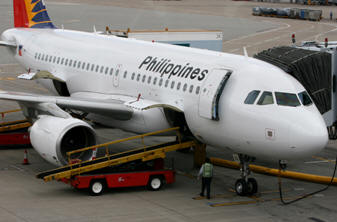|
|||||||||||
|
|
|
|||
|
By |
||||
 |
September 11, 2010
- Philippine Airlines (PAL) assures the passengers of continued
and unhampered service despite a notice of strike filed by its cabin
crew union. "PAL's operations remain normal and all flights are
operating as scheduled. There is no immediate work stoppage," PAL
spokesperson Cielo Villaluna stressed. Villaluna explained that the notice of strike filed by the Flight Attendants' and Stewards' Association of the Philippines (FASAP) commences a legal process by which the two parties, with guidance from the labor department, would find ways of striking a balance between what the union wants and what management can afford and is prepared to give. |
|||
|
|
||||
|
Under the law, parties have a 30-day cooling-off period after the filing of a notice of strike. During this time the labor secretary will continue to mediate and find a compromise settlement. It is also within the labor secretary's authority to issue an assumption order which automatically enjoins the intended strike.
Villaluna said the
union's plan to strike is ill-timed as it would scare away tourists and
cause further damage to the flag carrier?s fragile finances. ?We are
saddened by the union?s decision, but we recognize their right to file a
notice of strike,? Villaluna said.
She added that
management is willing to sit down again with FASAP leaders to discuss
and settle any pending issues in the 2007-2010 collective bargaining
agreement. Villaluna also refuted accusations of age and gender discrimination. ?The early retirement age is part of the negotiated CBA FASAP leaders signed on two separate dates. They complain of alleged inequity of early retirement provisions when in fact the older batch of FASAP members, including the union leaders themselves, have been receiving and enjoying financial benefits in exchange for the younger retirement age of their colleagues,? Villaluna stressed. |
||||
|
On the claim that
PAL discourages pregnancy among cabin attendants, Villaluna said there
were at least 65 cabin attendants who went on maternity leave last year.
?All of them received maternity benefits in accordance with the Labor
Code and the CBA. PAL even advanced P30,000 in SSS benefits before they
gave birth,? she said.
Philippine
Airlines, Inc. (abbreviated as PAL), also known historically as
Philippine Air Lines, is the flag carrier and national airline of the
Formerly one of
the largest Asian airlines, PAL was severely affected by the 1997 Asian
Financial Crisis. In what was believed to be one of the Philippines'
biggest corporate failures, PAL was forced to downsize its international
operations by completely cutting operations to Europe and eventually
Southwest Asia, cutting virtually all domestic services excluding routes
operated from Manila, reducing the size of its fleet and terminating the
jobs of thousands of employees.
The airline was
placed under receivership in 1998, gradually restoring operations to
many of the destinations it formerly serviced. PAL exited receivership
in 2007 with ambitious plans to further its previously-serviced
destinations, as well as diversify its fleet. |
|
|
| Other News Stories |
| ?AvStop
Online Magazine
Contact
Us
Return To News
|
|


